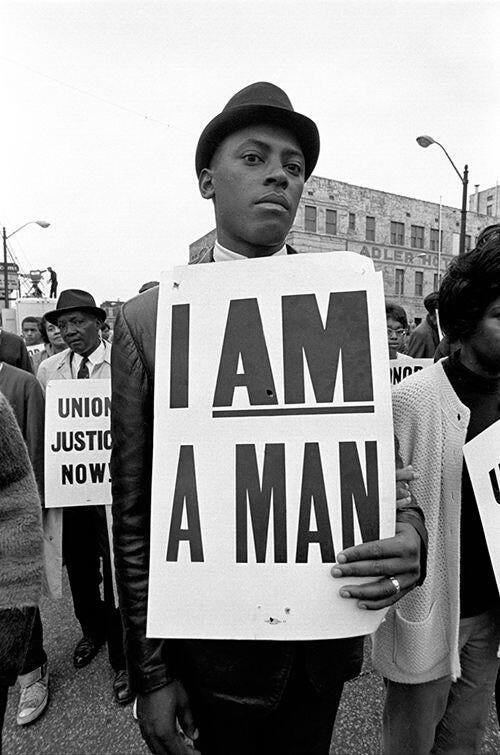DEI is Not Civil Rights
Conflating DEI with the Civil Rights movement is the latest tactic. Here’s why it is a lie
You’re going to hear that DEI is no different than Civil Rights for modern times.
Already, I have been told that DEI is what gave women the right to vote, paternity leave for men, and any anti-discrimination law you can think of since the origin of or Civil Rights movement.
None of that is true.
They are using a tactic which selects an easily defendable position, and pretending that is what they are and have been pursuing the entire time. It’s called a Motte and Bailey fallacy.
Here’s the problem: We have receipts.
The writings of the largest proponents of DEI seek to convince us of the need for discrimination based on race instead of its abolition. 2020 is not that long ago. Some of us remember what we were told.
“The defining question is whether the discrimination is creating equity or inequity. If discrimination is creating equity, then it is antiracist. If discrimination is creating inequity, then it is racist.” — Ibram X. Kendi, How to Be and Antiracist
Popular authors and academics like Robin D’Angelo and Ibram X. Kendi were lifted up to express the manner in which we were to pursue this conversation that we needed to have. Jack Dorsey, former CEO of Twitter, donated ten million dollars to the now defunct organization Kendi set up to study antiracism. This racial reckoning so popular in 2020.
Here is what came of that:
— All white people are racist. Even those who truly believe in white privilege and work to publicly acknowledge it are participating in a racist system that benefits them and therefore will always be racist.
— Economically successful black people who participate in the American system have internalized white supremacy to selfishly benefit themselves by working the racist system in their favor.
— Racism is not simply the belief in the superiority of one’s race, but requires a person to have the power to discriminate in order to be racist. So, only white people can be racist.
— Discrimination against white people is okay if it makes economic outcomes more equal.
— Differences in outcomes between racial groups is itself evidence of racist policies, regardless of the individual or collective actions of the people in those groups.
— White people who disagree with the theory of systemic racism or their complicity in that system are simply confirming their racism through their discomfort or denial of the ideas produced by this theory.
These ideas are what President Trump in 2020, and again today, along with sane Americans, seeks to rid us of. This is nothing like what came of our Civil Rights movement. Our Civil Rights movement moved us away from anything other than a colorblind society that sought to reduce any mention or care for color in assessing the nature of one’s character much less in our legal systems.
And no, colorblindness is not a racist invention by white supremacy to avoid talking about color. (They really believe this.) The term was coined by Wendell Phillips, who was an abolitionist and member of the American Anti-Slavery Society (ASA). He introduced a fourteenth constitutional amendment to prohibit any state action based upon race, that in his words would leave “a government color-blind.” Coleman Hughes’ latest book, The End of Race Politics details this history nicely. (pg. 47)
So when people push back against this dismantling of DEI as if we are dismantling the work of our Civil Rights heroes, remind them of the above ideas that were popular in 2020, and if they support those concepts.
Remind them that Atlanta school children were being racially segregated. Ask them if they support Buffalo public schools’ claim that “all white people” perpetuate systemic racism and should force kindergarteners to watch videos of dead black children, warning them about “racist police and state-sanctioned violence.” Do they think it’s ok that in Cupertino, CA, instructors forced a class of third-graders to deconstruct their racial identities then rank themselves according to their “power and privilege.” As a teacher, would they also give a student of mixed ethnicities a failing grade for refusing to confess his “white dominance?”
When they ask about the context of these things happening, ask them in what context any of this would ever be ok. Ask them why some teachers and adult educators or anyone thought this was ok and where they got the idea that it would be ok. It’s not simply a coincidence that all of these actions line up with the ideas expressed above.
No, DEI is not civil rights. It is a regression back to identifying people by race in order to maintain the cheap political power that comes with grievances. It specifically rejects the liberalism which characterizes our Constitution and the Civil Rights movement.
In their own words:
“Unlike traditional civil rights discourse, which stresses incrementalism and step-by-step progress, critical race theory questions the very foundations of the liberal order, including equality theory, legal reasoning, Enlightenment rationalism, and neutral principles of constitutional law.” — Critical Race Theory: An Introduction, by Richard Delgado and Jean Stefancic
We will continue to support defunding these ideas and our tax dollars should never support this type of modern racism.



